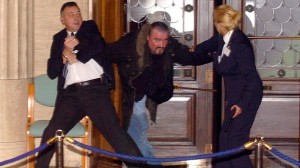UDA killer Michael Stone must serve the rest of a 30 year jail term for the Milltown cemetery attack, a court has ruled on Monday.
It means 58-year-old Stone will remain in the top security Maghaberry Prison for another 11 years.
And in 2024, the loyalist-for-hire killer, who will then be 69, could make his first application to the Parole Commissioners to be freed.
However, his release on parole is not automatic.
The Parole Commissioners will have to consider whether it is safe for the public to have Stone back on the streets.
Lord Chief Justice Sir Declan Morgan announced his decision in the Court of Appeal in Belfast.
In 1988, Stone threw grenades and fired shots in the cemetery during the funerals of three IRA members.
He had been released on licence as part of the Good Friday Agreement.
But Stone has been in prison since an attack at Stormont in 2006, when he was found guilty of attempting to murder Sinn Féin members Gerry Adams and Martin McGuinness.
Stone had previously failed in a bid to get his conviction overturned, claiming the incident was “performance art”.
He will now serve the 18 years remaining on his 30 year sentence for the Milltown attack, after he completes his 16-year sentence for the assassination bid on the nationalist politicians.
The loyalist paramilitary Michael Stone was sentenced to 16 years in prison for the attempted murder of Sinn Fein leaders Martin McGuinness and Gerry Adams in a raid on the Northern Ireland Assembly.
Stone’s attack on Stormont in November 2006 was the second time in 20 years that Stone had tried to murder Adams and McGuinness.
The 53-year-old, one of the most notorious terrorists of the Troubles in Northern Ireland, was also convicted of six charges including possession of weapons and explosive devices, at Belfast crown court.
He had claimed his attack was a work of performance art and the axe, garrotte, imitation handgun, three knives and homemade bombs he was carrying were artistic props.
Handing down the sentence in December 2008, Mr Justice Deeney said he had decided not to give Stone a life term on the grounds that his actions had not resulted in any serious injury, and the fact that he suffers from a degenerative muscle-wasting condition that, he acknowledged, would see him confined to a wheelchair in the future.
However, the judge said he also had to take into account the serious offences that Stone had already committed before his attack on Stormont.
“He could hardly have a worse criminal record,” Deeney said, “and I do take into account the very grave offences of which he was convicted in 1989.”
In mitigation, Orlando Pownall, Stone’s barrister, had asked the judge to show mercy on the former Ulster Defence Association hitman, and said it should be acknowledged that his client supported the Northern Ireland peace process and had been involved in meetings which had discussed ending loyalist violence.
“He had meetings with Mo Mowlam (then Northern Ireland secretary) and others and, while I acknowledge these were not critical and it wasn’t through him the peace process took place – that would be laughable – but he had taken part.
“He welcomes the peace process in Northern Ireland and hopes that the process will continue and power will be devolved without continuing struggle between either sides of the political divide.”
Stone killed three mourners in an attack on an Irish Republican Army funeral at Milltown cemetery in west Belfast in 1988. He was convicted of six murders, including those three, the following year.
Later, when he was in Maze prison, he said he had meant to kill Adams and McGuinness.
In 2000, Stone was freed early on licence, under the Good Friday agreement.
On Monday, his licence was revoked and has to serve remainder of his 30-year tariff.
In his ruling on Monday, the Lord Chief Justice said that although Stone pleaded not guilty to all the charges he instructed his Counsel to take no active part in resisting the prosecution case which was based on the eye witness evidence and his confessions.
The Lord Chief Justice said that in this case there was a clear finding by the trial judge that the prisoner displayed no evidence of remorse and accordingly the manner in which he defended his case could not be given weight.
The Lord Chief Justice considered that the killings in 1988 were “professional as the prisoner had offered his services as a killer to any loyalist group who would use him.”
He added: “The killings were politically motivated in that they were directed at a section of the public identified by the prisoner as holding certain political views.
“The prisoner also committed multiple murders with the intent to strike fear into the community at large.”
The senior appeal judge concluded that this was undoubtedly a case where the higher starting point applied.
The Lord Chief Justice referred to the other aggravating factors: the killings were planned and premeditated and the prisoner had armed himself with extensive weaponry.
He said there were no mitigating factors of significance.
“The effect on his victims will live with them forever,” added the Lord Chief Justice.




